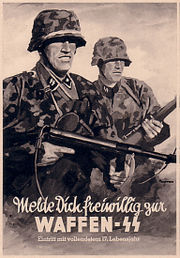In an interview with the Frankfurter Allegmeine Zeitung to promote his upcoming autobiography – Beim Häuten der Zwiebel (Peeling the Onion)- Nobel Prize winner Günter Grass made the shocking admission that as a youth he had joined the Waffen SS. Grass also claims to have met the young future Pope Benedict XVI in a detention camp at Bad Aibling, possibly pointing out certain parallels between his life’s arc and that of Josef Ratzinger.
But there are significant differences: Ratzinger, like nearly every youth in the waning days of the war, joined the Hitler-Jugend. This was compulsory for any boy between the ages of 14 and 18 after 1938. The Hitler Youth was a paramilitary group that mostly performed anti-aircraft defense and fire duty under adult supervision in the last years. Ratzinger never concealed his participation in the youth organization, while Grass waited until he was nearly 80 years old to admit to joining the Waffen-SS – labeled a criminal organization by the Nuremberg Tribunals (although there is no evidence that Grass’s unit committed any war crimes).
Grass’s confession has led to a firestorm of controversy; Lesefieber-Weblog has done a good job of compiling a list of coverage and reaction. One reason why there has been such a public outcry over this is that Grass has always presented himself as some sort of moral authority: he is always the first to castigate the United States for its moral lapses. The consensus by many of the critics and historians in Germany is that Grass’s confession "comes a bit late":
Hellmuth Karasek, a leading literature critic, agreed there was no reason to reproach Grass for his membership of the Nazi’s elite SS. Grass now admitted he volunteered for submarine duty at 15 but was rejected. He was later called up to the SS at 17.
Grass had previously said he was drafted in 1944 as a flak helper and held as a prisoner of war until 1946. After the war, he become an outspoken pacifist and icon of the German left.
"The fact he was in the SS at 17 is by itself a misdemeanour — had Grass not been one to throw his weight around as a moral authority so much since then," Karasek told German radio.
"If I were cynical, I would say he did not reveal it sooner at the risk of not winning a Nobel prize. Don’t misunderstand me: Grass deserved the Nobel prize more than any other German writer. But everything now has to be seen in a new light."
"After 60 years, this confession comes a bit too late," Joachim Fest, a leading historian, told Der Spiegel magazine. "I can’t understand how someone who for decades set himself up as a moral authority, a rather smug one, could pull this off."
Grass biographer Michael Juergs was dumbfounded. "I feel a personal disappointment," Juergs said."
Definitely worth reading is Hella Streicher’s commentary on her blog, and she speaks from a highly personal perspective: her father was a Nazi, and her grandfather was the notorious fanatical antisemite Julius Streicher (later tried and executed at Nuremberg).
…nun ist es an der Zeit, daß die Welt …lernt, was sie längst wissen könnte: daß hinter einem großen Moralisten meist ein kleiner Sünder steht, manchmal sogar ein großer, und nicht selten gar ein Schurke. Zu lernen ist also einmal wieder, wie man zwischen den Zeilen liest – nicht nur in den Schriften unserer gefeierten Autoren, sondern vor allem in den Reden derer, die unsere Welt nicht nur mit Worten, sondern mit Waffen verändern wollen.
(..it’s finally time that the world realizes what it should have known all along: that within a great moralist there usually resides a little sinner, often even a major one – maybe even a scoundrel. We must always learn to read between the lines – not only of our celebrated writers, but above all in the speeches of those who want to change the world not just with words – but with weapons.)


